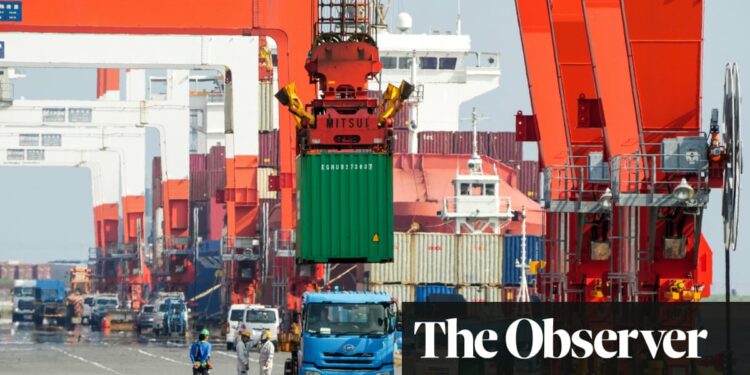The business and trade secretary, Jonathan Reynolds, has signalled a new twin-track approach to UK trade policy, in which the Labour government will pursue closer ties with the European Union while at the same time seeking new global partnerships further afield.
Writing for the Observer online, Reynolds welcomes the UK’s imminent entry into the Comprehensive and Progressive Agreement for Trans-Pacific Partnership (CPTPP) as a “real win” for British exporters.
His comments are further confirmation that Keir Starmer’s government will not seek to rejoin the EU or its economic structures. If Britain were to rejoin the EU, it would have to leave the Trans-Pacific Partnership, since having separate free trade agreements is incompatible with being a member of Europe’s single market and customs union.
The CPTPP is a free trade agreement between Australia, Brunei, Canada, Chile, Japan, Malaysia, Mexico, New Zealand, Peru, Singapore and Vietnam.
Under the Tory government, Britain signed an agreement to join the CPTPP in July 2023, and the accession process is nearing completion. The bloc will have a combined GDP of more than £12tn including Britain.
Despite Reynolds’ enthusiasm for the CPTPP, economists say Britain’s entry will have little short- or medium-term effect on the UK’s trade or GDP, and certainly won’t compensate for its exit from the EU, the single market and the customs union.
Last year, as the Tories presented entry into the Trans-Pacific Partnership as a cornerstone of post-Brexit “global Britain”, the Office for Budget Responsibility said it would add just 0.04% to GDP in the “long run”, which it defined as 15 years of membership.
The spending watchdog also said that two separate bilateral deals between Britain and Australia and New Zealand, also hailed as landmark trade agreements following Brexit, “might increase the level of real GDP by a combined 0.1% by 2035”.
In his article, Reynolds makes clear that Labour would also be pushing for closer ties with the EU, outside its formal economic and trading structures.
skip past newsletter promotion
Analysis and opinion on the week’s news and culture brought to you by the best Observer writers
Privacy Notice: Newsletters may contain info about charities, online ads, and content funded by outside parties. For more information see our Privacy Policy. We use Google reCaptcha to protect our website and the Google Privacy Policy and Terms of Service apply.
after newsletter promotion
“The EU is not just our closest trading partner, it’s still our largest trading partner by quite some margin,” he writes.
“Yet, we know that thousands of British businesses have stopped exporting to Europe altogether. It’s no secret as to why. The last government’s adversarial approach to working with the EU resulted in UK firms being buried in bureaucracy. We’re changing course – working towards negotiating the removal of unnecessary border checks while securing mutual recognition for professional qualifications so British businesses can more easily operate in France, Germany, Italy and beyond.
“At the same time, we’re pursuing high-quality, barrier-removing trade deals with partners around the world, including the Gulf Cooperation Council (GCC) and India. A deal with the GCC alone could increase bilateral trade by 16%, generating an additional £1.6bn for our economy in the long run.”
Source link : https://www.theguardian.com/politics/article/2024/aug/25/government-to-seek-global-trade-deals-for-uk-at-expense-of-formal-eu-re-entry
Author :
Publish date : 2024-08-25 07:00:00
Copyright for syndicated content belongs to the linked Source.



